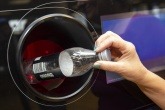Scotland delays DRS over coronavirus fears
The Scottish Government has delayed the introduction of its deposit return scheme (DRS) until 1 July 2022 amid concerns over the Covid-19 pandemic.

With coronavirus expected to have long-lasting and devastating economic impacts, Environment Secretary Roseanna Cunningham confirmed on Monday (16 March) that the DRS will be pushed back from the original start date of 1 April 2021 to allow businesses time to prepare for the scheme.
According to Zero Waste Scotland, there will be a few changes to the proposed DRS plans following consultation with island communities, feedback from the Scottish Parliament’s Environment Committee and stakeholder input. There will also be 17,000 more return points across the country, in order to make the scheme as accessible as possible.
Cunningham explained: “Our Deposit Return Scheme will be the first national scheme of its type operating in the UK. By including a wide range of materials, including glass, and setting a deposit of 20p, we are giving the people of Scotland a clear and straightforward way to do their bit for the environment.
“Having listened to the views of stakeholders, I have agreed to extend the ‘go-live’ date from April 2021 to July 2022. This will give businesses more time to prepare their premises for the scheme and crucially, provides flexibility in the immediate term as the whole country prepares to deal with Covid-19 – the impact of which continues to be closely monitored.
“One very important way of achieving our climate targets is in tackling throw-away culture and building a circular economy where our resources are kept in use for as long as possible, and our Deposit Return Scheme is just one part of this.”
Scotland goes all in
Scotland is set to adopt the ‘all in’ DRS model, where all drinks containers of between 50 millilitres and three litres in size made from aluminium, steel, glass and PET plastic will carry a deposit of 20 pence, which can be recouped when returned for recycling.
Although Zero Waste Scotland has estimated that this will result in a 90 per cent reduction in litter, concerns have been raised with the proposed scheme – the Aluminium Packaging Recycling Organisation (Alupro) has claimed that the DRS could result in 823 million more plastic bottles entering the market, as the flat-rate 20 pence deposit will encourage consumers to choose larger plastic bottles rather than multi-pack cans.
The impact of the DRS on small businesses has also been discussed, with the Federation of Small Businesses calling for businesses under 200 square feet to be exempt from the scheme due to space and staffing restrictions. With small businesses set to face financial strain amid the coronavirus fallout, such issues look likely to become increasingly pertinent.









